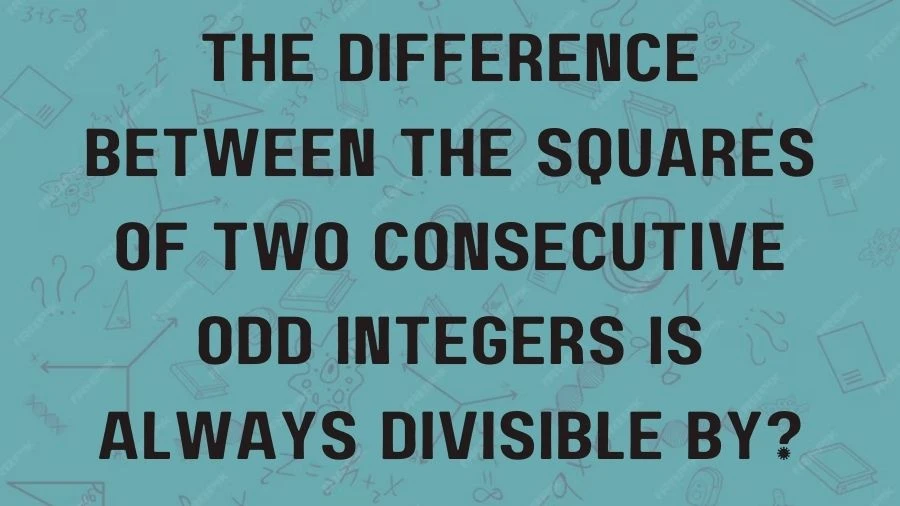If you happen to be viewing the article The Difference Between the Squares of Two Consecutive Odd Integers is always Divisible by? ? on the website Math Hello Kitty, there are a couple of convenient ways for you to navigate through the content. You have the option to simply scroll down and leisurely read each section at your own pace. Alternatively, if you’re in a rush or looking for specific information, you can swiftly click on the table of contents provided. This will instantly direct you to the exact section that contains the information you need most urgently.
Curious about the connection between consecutive odd numbers and their squared differences? We’re here to explain why that difference is always divisible by a certain number. Dive into the world of math with us!
The Difference Between the Squares of Two Consecutive Odd Integers is always Divisible by?
The Difference Between the Squares of Two Consecutive Odd Integers is always Divisible by 8
-
Let 2x + 1 and 2x + 3 represent any two consecutive odd integers, where x is an integer.
-
Calculate the difference of their squares:
-
Expand the squares:
- (4x^2 + 12x + 9) – (4x^2 + 4x + 1)
-
Simplify:
-
Factor out 8:
-
Observe that 8 is a factor of the expression.
Therefore, the difference between the squares of two consecutive odd integers is always divisible by 8.
Properties of Consecutive Integers and Their Squares
Here are some notable properties of consecutive integers and their squares:
Consecutive Integers:
- Difference: The difference between any two consecutive integers is always 1.
- Even and Odd:
- Consecutive even integers have a difference of 2.
- Consecutive odd integers have a difference of 2.
- Divisibility:
- In any sequence of n consecutive integers, there is always exactly one integer divisible by n.
- Sum:
- The sum of n consecutive odd integers is always divisible by n.
- Product:
- The product of two consecutive integers is always even.
- The product of any three consecutive integers is always divisible by 6.
Squares of Consecutive Integers:
- Difference: The difference between the squares of two consecutive integers is always equal to the sum of the integers themselves.
- Example: 5^2 – 4^2 = 25 – 16 = 9 = 4 + 5
- Pattern: The units digits of consecutive squares follow a repeating pattern: 1, 4, 9, 6, 5, 6, 9, 4, 1, …
- Odd and Even:
- The square of an odd number is always odd.
- The square of an even number is always even.
Applications:
- Number theory problems
- Algebraic manipulations
- Geometric patterns and sequences
- Problem-solving in various fields like physics, engineering, and computer science
Thank you so much for taking the time to read the article titled The Difference Between the Squares of Two Consecutive Odd Integers is always Divisible by? written by Math Hello Kitty. Your support means a lot to us! We are glad that you found this article useful. If you have any feedback or thoughts, we would love to hear from you. Don’t forget to leave a comment and review on our website to help introduce it to others. Once again, we sincerely appreciate your support and thank you for being a valued reader!
Source: Math Hello Kitty
Categories: Math

